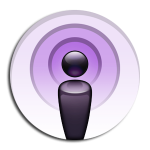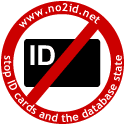A podcast is a free (and usually legal) audio or other media file on the web—like a radio or TV show or a piece of music. It also requires an associated announcement system called a ‘feed’ otherwise it is just a file. Yes, you could still download it, but the key feature of a podcast is that you are informed when new ones are available and can be set to download them automatically. Note that not all feeds are podcasts; this is a much wider facility and many are just news items or weblog postings. You will come across the little orange symbol quite often, like the one under “Meta” in my sidebar.  Podcast feeds often use the dedicated purple icon to distinguish them.
Podcast feeds often use the dedicated purple icon to distinguish them.
Optionally podcasts also have an entry in a directory system. This is how you can find them in the first place. It is optional because ordinary web sites and blogs can and do announce their podcasts but the directory functions a bit like a specialised search engine allowing you to find the ones of interest to you.
Podasts are usually in mp3 format but they don’t have to be. They could be in Apple, Real or Windows Audio formats, though that would limit their appeal and what they can be played on. They can also be video or even written and still picture formats like PDF files.
Podcasts are not continuous streaming media—the latter are not files but come down to your computer in real time and can’t be saved (at least, not easily). Examples would be live internet radio services, though the stations may also offer podcasts of previous shows.
How to find podcasts
Most of the directories have a heavy American bias but some have dedicated regional sections as well, though often not in each individual category.
The biggest one of all is iTunes but it is heavily slanted towards sales of music. Another catch is that it only works with the iTunes computer program or an iPod or iPhone. Other popular ones are Podshow, Podcast Alley, Podfinder and IndiePodder which all seem to have been taken over by Mevio but one that still seems to be independent is Podcast Blaster.
There are also specialist directories such as www.religious-podcasts.net which concentrate on particular categories.
What do I need to subscribe and listen
You don’t have to have an iPod or any portable player, though if you do you will enable to carry your shows around with you. If you do have a portable media player then I suggest you follow the guides from the manufacturer as they are all a bit different. They generally synchronise when they are plugged into a computer with podcasts downloaded using a particular program but some models connect to the internet directly.
On a computer you will need something that is called a ‘feed reader’ or ‘news aggregator’ and most methods are free once you have the necessary network connections. There are very many feed readers available but some are dedicated to the media files that podcasts provide. Again the biggest and best known is iTunes which is pre-installed on Apple Macs and can be downloaded from www.apple.com for Windows (but is not available for Linux). This hooks you straight into the directory (“the Store”) mentioned above but it only supports Apple’s own portable players. An alternative is Juice which is independent, runs on Mac, Windows and Linux and supports most portable players. All the time they are running the agregators regularly check each of your subscriptions for a new edition to be posted and when it is, it downloads it automatically ready for you to listen to.
Instead of software on your computer you could use a web based system such as Yahoo or Google. Both require you to sign up (for free) but are very easy to use, you just have to visit them regularly to keep up with your subscriptions.
Which method you choose is very much a personal preference as they often have very different features and ways of doing things.
A footnote: sometimes you will see a feed that starts itpc:// This is dedicated to the iTunes software and may not work if you use something different; however the feed is perfectly all right if you change the start to http:// The same is true for pcast:// but for different reasons.






 Webmaster
Webmaster